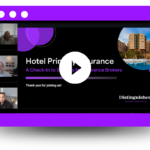You may be planning to boost your sales force or replace an agent/producer who has left the firm. Giving the new kid on your block an opportunity for success involves having an effective new insurance agent training plan in place. After all, it’s your producers who are ideal ambassadors for your products and services and the ones on the front-line generating revenue for your insurance carrier partners, your agency, and themselves.
Why Implement a Training Program
Agent training helps new employees gain the technical skills, coverage and service knowledge, and legal and regulatory acumen they need to be successful. It also helps agencies attract the right type of individuals you want working for you. A robust, comprehensive, and ongoing training program reflects an agency’s commitment to empower their employees and support them in their success. The key is providing ongoing training, as without a continuous program that is nimble and agile, producers won’t necessarily be abreast of the latest in market changes and how to handle them, and have insight into technology advances and what that means for the businesses the organization serves (think AI and underwriting for bars and restaurants, telematics and the transportation industry, Insurtech and how start-ups are impacting the commercial lines insurance space, etc.).
What Makes Successful Agent Training
Successful training involves three pillars:
- Continuous learning structured around building skills over time.
Insurance is a people business so it’s imperative that agents acquire the communication and sales skills necessary to be able to nurture a potential new customer, establish trust, and eventually gain a client. These skills take time to develop and it’s better to have a training program that consistently reinforces how to obtain, perfect and tailor these skills to an agent’s own strengths in lieu of a weeklong session that ends with an agent left alone on the firing line.
- On-demand learning that reflects today’s environment.
Think about how differently agents are selling and servicing customers in our new remote-work landscape. While agents have adapted pretty well, additional training is necessary to hone one’s skills as producers make presentations online and forgo that face-to-face interaction that characterizes our industry. Newbies also require training tailored to our new virtual reality.
Another example that reflects the need for on-demand, on-point training is today’s firming market. Many producers have never sold during a hard-market cycle and are accustomed to overcoming objections and selling in an environment where competition was abundant and pricing reflected a buyer’s (insured’s) market. Selling during a firm market is completely different and requires more of an educational approach. You need to be able to tweak your training so that your agents can help insureds understand what is going on, including why rates are up and capacity is down, how the agent’s organization and its market relationships will facilitate the submission and renewal process, what other alternative solutions are available if required limits and/or coverage terms are unattainable, why a robust risk management and loss control program is integral to improving one’s risk profile, and so on.
- Learning aligned with both the agent’s and organization’s goals.
Consider tailoring your training programs to help producers achieve their goals. Meet with your new agents and discuss where they see themselves in one year, two years, and five years. How do their objectives fit in with that of the organization’s and how can you provide a win-win situation with the necessary training and support you offer? For example, perhaps you want to expand your agency’s footprint in the construction industry. You hired an individual who has worked in the construction industry for years and is now looking to make a switch to insurance. He brings intimate, in-depth industry knowledge, providing you with a competitive edge in speaking and walking the talk. In this case, he needs to hone his sales skills and have ongoing training on what insurance products will address the construction industry’s unique exposures so that he can generate business and help your agency gain market share.
Take the time to map out your short- and long-term goals for your agents to determine what type of training plan is needed to meet these goals. Look at the various training programs (we’ll be discussing this in a future blog) available and how they can help you achieve your goals. Be sure your training is continuous to reflect what is going on in the insurance industry, your targeted markets, and the world in general.




